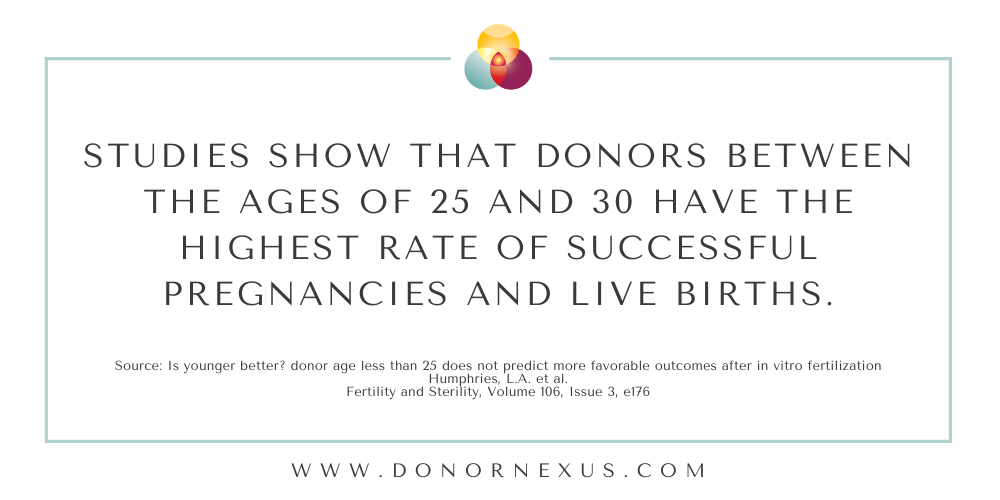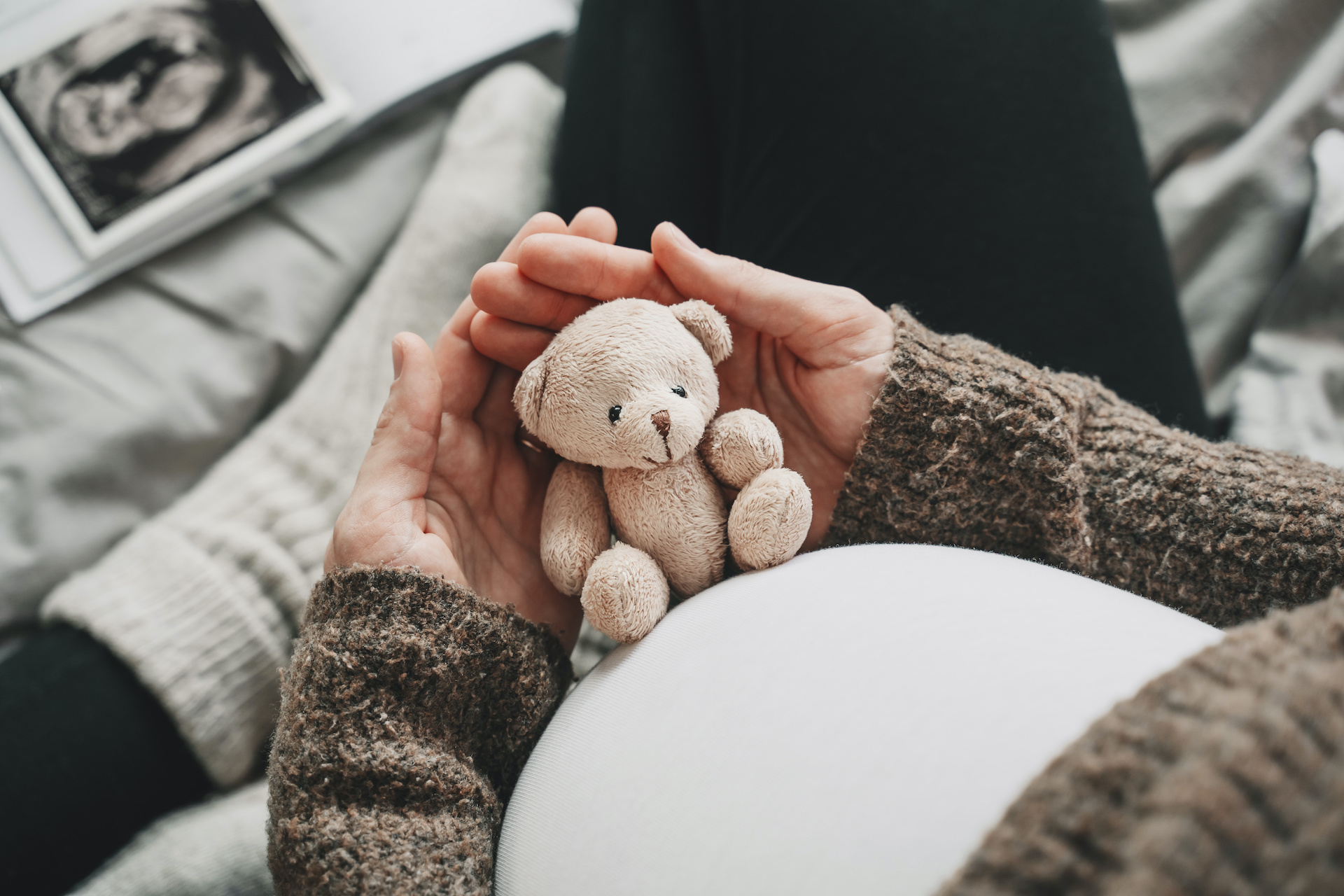 Oct 18, 2024 | by Lucy Solie-Vilker, Program Director
Oct 18, 2024 | by Lucy Solie-Vilker, Program Director
When selecting an egg donor, one of the key factors that fertility specialists and intended parents often consider is the donor’s age. But what exactly is the "optimal age" for an egg donor, and why does it matter so much?
What is the Optimal Age for an Egg Donor?
Many fertility clinics and doctors recommend choosing a donor under 30 years old, especially for first-time donors. For proven donors—those who have successfully donated in the past—clinics may extend the age range slightly, up to around 34. But why is there such a focus on this age range, and what does the research say about it?
The Impact of Age on Egg Quality
The primary reason age is so important in egg donation is due to its strong link with fertility. As women age, both the quantity and quality of their eggs decline. Younger donors are more likely to have higher-quality eggs, which increases the chances of successful fertilization, embryo development, and a healthy pregnancy for the intended parents.
This is why fertility clinics tend to be stricter with age requirements for first-time donors, often setting the cutoff between 18 and 30 years old. Clinics may allow proven donors who are over 30 to continue donating, as they have demonstrated their fertility in prior donations. However, most clinics still prefer that donors be under 34 to maximize the chances of success.
The Research on Optimal Egg Donor Age
So, what does the research say about the optimal age for an egg donor? Studies conducted by Harvard Medical School and Boston IVF aimed to answer this question by examining the relationship between donor age and the success rates of IVF treatments using donor eggs. The study concluded that donors between the ages of 25 and 30 showed the highest rates of successful pregnancies and live births.

These studies emphasized that while egg donors in their early 20s can still produce high-quality eggs, there is no evidence to suggest that donors under 25 achieve better pregnancy or live birth outcomes compared to those in the 25-30 age range.
Why the Optimal Age Matters for Intended Parents
For intended parents, the donor's age is a key consideration because it can directly impact the chances of a successful outcome. Younger donors tend to have a higher ovarian reserve (the number of eggs available), making them more likely to produce multiple healthy eggs in a single donation cycle. This can increase the number of viable embryos available for transfer, improving the chances of conception.
Additionally, using eggs from a donor within the optimal age range can reduce the risk of chromosomal abnormalities, which are more likely to occur in older eggs. By selecting a donor in their mid to late 20s, intended parents can improve the likelihood of a healthy pregnancy and successful outcome.

What About Donors Under 25?
Some clinics accept egg donors as young as 18, though others set the minimum age at 21. At Donor Nexus, the minimum age for egg donors is 19. While younger donors can and do provide healthy eggs, and may have a higher quantity of eggs retrieved, the data from the previously mentioned studies suggests that fertilization rates improve as donors reach their mid to late 20s.
Proven Donors Over 30: Is It Risky?
For proven egg donors who are over 30 but under 34, many clinics are more lenient. A proven donor is someone who has successfully donated eggs that resulted in a pregnancy or live birth. In these cases, the donor’s age is less of a concern because their past donations provide reassurance that their eggs are of high quality. However, even proven donors may experience a gradual decline in fertility after 30, which is why most clinics set an upper age limit of 34 for donations.
Conclusion: The Sweet Spot for Egg Donation
While there isn’t one universally “perfect” age for egg donation, the research suggests that donors between the ages of 25 and 30 offer the best combination of egg quality and consistency. Donors in this age range tend to have a high ovarian reserve and produce healthier eggs, leading to better outcomes for intended parents.
For first-time donors, the age cutoff is typically 30, but clinics may accept proven donors up to age 34. However, it’s important to remember that every clinic has its own guidelines, and each donor’s health and individual circumstances will also play a role in determining eligibility.
Determining the Best Egg Donor for Your Specific Situation
Your fertility physician will assess more than just the donor's age to determine the best match for your specific needs. Factors like AMH (Anti-Müllerian Hormone) levels, which indicate ovarian reserve, help predict how many healthy eggs a donor can produce. Additionally, genetic testing may be conducted to ensure compatibility and reduce the risk of inherited conditions.
Alongside your physician, your Donor Nexus case manager will help you select a donor based on your preferences, such as whether you’re looking for a fresh or frozen donor egg cycle and an identified or non-identified donation.
Browse Our Donor Database and Schedule a Consultation Call
To get started, register for free access to our egg donor database, featuring a diverse selection of donors from the U.S. and internationally. For more information on selecting the right donor for your IVF journey, contact our team for personalized guidance. We offer a complimentary one-hour consultation call to discuss your options, answer questions, and discuss the details. Get in touch today and take the next step toward building your family!
Find Additional Resources in the Donor Nexus Blog:
Donor Database
Register now to receive free and instant access to our online donor database
GET STARTED »
Finding this Program was a Godsend...
"We are so very excited! Thank you for your help in making this experience so easy. I will absolutely recommend Donor Nexus. We had been to 3 other doctors who had told us there was a 2-year waiting list for donated embryos. Finding this program was a godsend.”
– Intended Parent J.D.
View Testimonials


